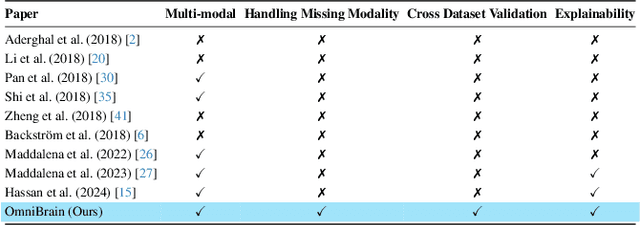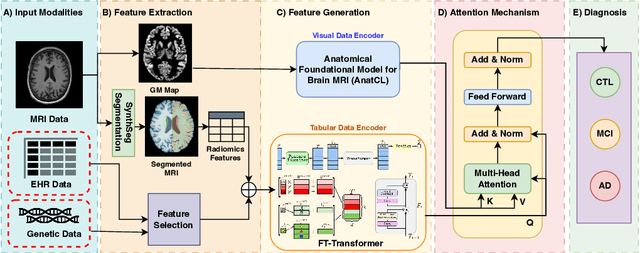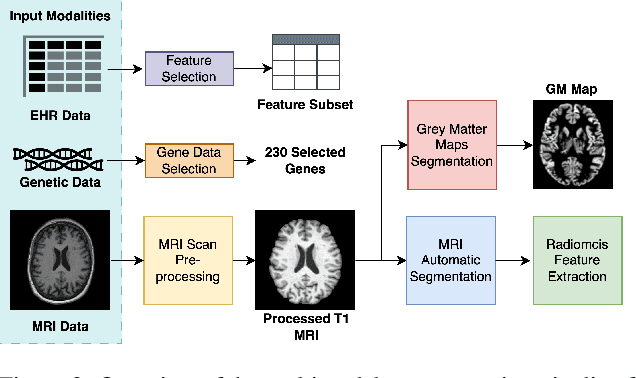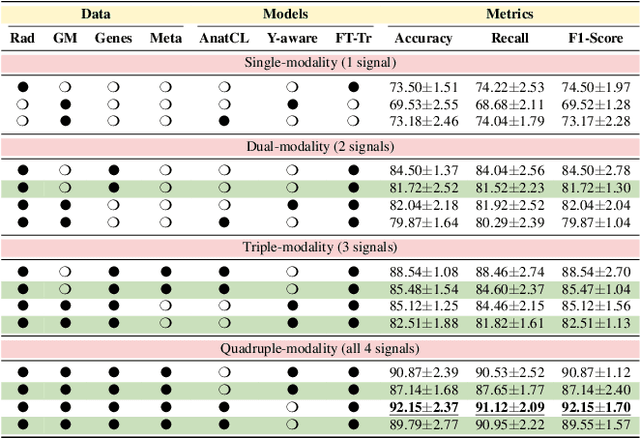Yasser Ashraf
Not Only Grey Matter: OmniBrain for Robust Multimodal Classification of Alzheimer's Disease
Jul 28, 2025



Abstract:Alzheimer's disease affects over 55 million people worldwide and is projected to more than double by 2050, necessitating rapid, accurate, and scalable diagnostics. However, existing approaches are limited because they cannot achieve clinically acceptable accuracy, generalization across datasets, robustness to missing modalities, and explainability all at the same time. This inability to satisfy all these requirements simultaneously undermines their reliability in clinical settings. We propose OmniBrain, a multimodal framework that integrates brain MRI, radiomics, gene expression, and clinical data using a unified model with cross-attention and modality dropout. OmniBrain achieves $92.2 \pm 2.4\%$accuracy on the ANMerge dataset and generalizes to the MRI-only ADNI dataset with $70.4 \pm 2.7\%$ accuracy, outperforming unimodal and prior multimodal approaches. Explainability analyses highlight neuropathologically relevant brain regions and genes, enhancing clinical trust. OmniBrain offers a robust, interpretable, and practical solution for real-world Alzheimer's diagnosis.
GeoLLaVA: Efficient Fine-Tuned Vision-Language Models for Temporal Change Detection in Remote Sensing
Oct 25, 2024Abstract:Detecting temporal changes in geographical landscapes is critical for applications like environmental monitoring and urban planning. While remote sensing data is abundant, existing vision-language models (VLMs) often fail to capture temporal dynamics effectively. This paper addresses these limitations by introducing an annotated dataset of video frame pairs to track evolving geographical patterns over time. Using fine-tuning techniques like Low-Rank Adaptation (LoRA), quantized LoRA (QLoRA), and model pruning on models such as Video-LLaVA and LLaVA-NeXT-Video, we significantly enhance VLM performance in processing remote sensing temporal changes. Results show significant improvements, with the best performance achieving a BERT score of 0.864 and ROUGE-1 score of 0.576, demonstrating superior accuracy in describing land-use transformations.
Arabic Dataset for LLM Safeguard Evaluation
Oct 22, 2024Abstract:The growing use of large language models (LLMs) has raised concerns regarding their safety. While many studies have focused on English, the safety of LLMs in Arabic, with its linguistic and cultural complexities, remains under-explored. Here, we aim to bridge this gap. In particular, we present an Arab-region-specific safety evaluation dataset consisting of 5,799 questions, including direct attacks, indirect attacks, and harmless requests with sensitive words, adapted to reflect the socio-cultural context of the Arab world. To uncover the impact of different stances in handling sensitive and controversial topics, we propose a dual-perspective evaluation framework. It assesses the LLM responses from both governmental and opposition viewpoints. Experiments over five leading Arabic-centric and multilingual LLMs reveal substantial disparities in their safety performance. This reinforces the need for culturally specific datasets to ensure the responsible deployment of LLMs.
 Add to Chrome
Add to Chrome Add to Firefox
Add to Firefox Add to Edge
Add to Edge